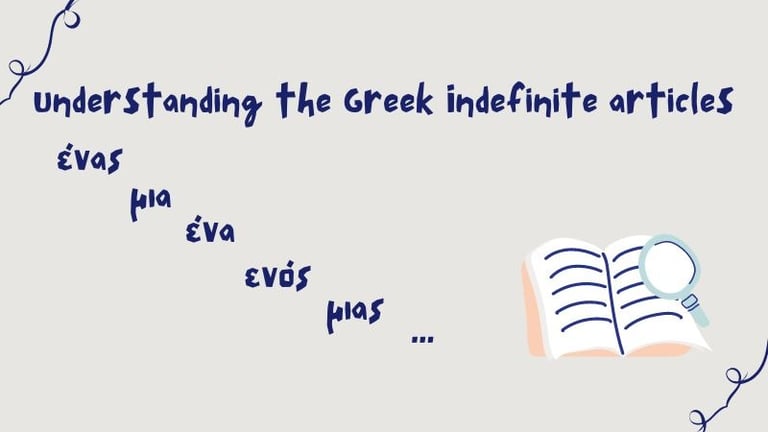The Greek Indefinite Article Explained
Learning Greek can be an exciting journey, especially when you start to grasp key grammatical concepts like articles. In this post, we'll dive into the Greek indefinite article, an essential part of basic communication.
LEARN GREEK ONLINE
10/1/20245 min read
In Greek, articles play a critical grammatical role by providing clarity about the gender, number, and definiteness of nouns. They help distinguish between specific and non-specific references, guiding how we interpret the subject of the sentence.
For example, "ο" (the) for masculine nouns or "ένα" (a) for neuter nouns indicate whether we are speaking about something specific or general. Without correct article usage, sentences can become vague or grammatically incorrect, making it harder to convey precise meaning.
Understanding how to use the Indefinite article correctly is important for constructing sentences, particularly when referring to non-specific nouns. Whether you're describing "a book" or "an apple," getting this fundamental element of Greek grammar right will boost your confidence in everyday conversations.
Greek Grammatical Articles
Introduction


What is the Indefinite Article in Greek?
In Greek, the indefinite article corresponds to the English "a" or "an" and is used when referring to non-specific or general items. Just like in English, the indefinite article appears before a noun to indicate that you are talking about one of many possible examples of that noun. For instance, "a house" (ένα σπίτι) refers to any house, rather than a particular one.
However, Greek has gendered nouns, which means the indefinite article must agree in gender and number with the noun it modifies.
There are three forms of the indefinite article in Greek:
ένας for masculine nouns.
μία/μια for feminine nouns.
ένα for neuter nouns.
When to Use the Indefinite Article
In Greek, nouns fall into three gender categories: masculine, feminine, and neuter. Each noun takes a specific form of the indefinite article depending on its gender.
The masculine indefinite article is ένας, used with singular masculine nouns. For example:
Ένας άντρας (a man)
Ένας σκύλος (a dog)
The feminine indefinite article has two forms: μία and μια. Both are correct and interchangeable, but "μια" is more commonly used in everyday speech. Here are some examples:
Μία/Μια γυναίκα (a woman)
Μία/Μια καρέκλα (a chair)
The neuter indefinite article is ένα, used with neuter singular nouns. For example:
Ένα παιδί (a child)
Ένα βιβλίο (a book)
Greek Indefinite Article Forms and Gender
The Greek indefinite article is used similarly to its English counterpart, but there are a few unique nuances to keep in mind. Let's take a look at some of the most common situations where it is used:
1. Introducing Non-Specific Nouns
Just like in English, the Greek indefinite article is used when you're talking about a non-specific or generic item. For example:
Θέλω έναν καφέ.
(I want a coffee.)Αγόρασα ένα αυτοκίνητο.
(I bought a car.)
2. Expressing uncertainty or Non-specificity
When describing a situation where there is no need to determine or name a specific person/object.
Ένας άνδρας με ρώτησε κάτι. (A man asked me about something)
Θα μιλήσουμε μια άλλη φορά. (We'll talk another time.)
3. Expressing Quantity
Greek indefinite articles can indicate "one" in terms of quantity, emphasising the singular nature of the noun:
Έχω έναν αδερφό.
(I have a/one brother.)Υπάρχει μία λύση.
(There is a/one solution.)Πήγα μια βόλτα. (I took a stroll).
Common mistakes to avoid
While the indefinite article in Greek is essential for referring to non-specific nouns, there are several situations where it is omitted. Let’s take a closer look at these cases:
1. Uncountable or Abstract Nouns
In Greek, the indefinite article is not used with uncountable or abstract nouns. These nouns represent concepts, substances, or ideas that can't be easily counted, such as "νερό" (water), "χρήματα" (money), or "υπομονή" (patience). For instance, you would typically say "Πίνω νερό" (I drink water), omitting the article "ένα," since water is uncountable. Similarly, with abstract nouns like "υπομονή" (patience), you wouldn’t use an article: "Χρειάζεται υπομονή" (It takes patience. Here the indefinite article 'μια' is omitted). This rule parallels English, where we also omit articles with uncountable nouns.
2. General or Generic Statements
When making general or generic statements about entire categories or types of things, the indefinite article is typically omitted in Greek.
For example, "Ελπίζει να βρει ειρήνη και ευτυχία" (He/She hopes to find peace and happiness.) expresses a general desire for said feelings, without the need for an article before "ειρήνη" or "ευτυχία". In such cases, the noun is treated generically, representing the entire class or group it refers to. Similarly, you would say "Η γνώση είναι δύναμη" (Knowledge is power), where the noun "γνώση" (knowledge) doesn’t need an article to convey its general meaning. Instead, in this context, the feminine definitive article ''Η'' is preferred.
3. Professions and Roles Without Specific Reference
When describing someone’s profession or role, especially in sentences that provide general information without specific reference, the indefinite article is often omitted. For example, instead of saying "Είναι ένας δάσκαλος" (He is a teacher), you would typically say "Είναι δάσκαλος". This omission is common in statements where the profession or role is used as a general identity marker rather than focusing on one particular instance. The same rule applies when talking about someone’s role, like "Είναι πατέρας" (He is a father), with no article before "πατέρας."
When NOT to Use the Indefinite Article
While the rules are simple, beginners often make some common mistakes with the indefinite article. Here are a few things to watch out for:
Gender Agreement: Ensure that the article matches the gender of the noun. Using the wrong form can change the meaning of the sentence or make it grammatically incorrect.
For example:Incorrect: Ένας γυναίκα
(A woman)Correct: Μία/Μια γυναίκα
Number Agreement: The indefinite article is only used with singular nouns. In Greek, plural nouns do not take an indefinite article.
Incorrect: Ένας βιβλία (Some/few books)
Correct: Βιβλία (Books) - Depending on context, relevant pronouns and adjectives like 'μερικά' or 'κάποια' can be used before the noun.
How the Indefinite Article Affects Sentence Structure
In Greek, the position of the indefinite article can change the emphasis of a sentence, even though the meaning remains the same.
Let's explore this with examples.
Before the Verb:
Ένα βιβλίο διάβασα.
After the Verb:
Διάβασα ένα βιβλίο.
English: I read a book.
Both sentences are grammatically correct, but in the first example, the focus is on the book itself, while the second emphasises the action of reading.
Greek allows this flexibility to shift emphasis depending on the context or what the speaker wants to highlight.


Practice Makes Perfect
To master the use of indefinite articles in Greek, practice is key. Try forming sentences using common nouns and ensure you match the correct article to the gender, case, and number of the noun. Pay attention to whether the noun is countable or uncountable to avoid unnecessary article usage.
Here are a few practice sentences to get you started:
Έχω _____ (ένα/μία/ένας) βιβλίο.
(Answer: ένα)Αγόρασα _____ (ένας/μία/ένα) σκύλο.
(Answer: ένα)Αυτή είναι _____ (έναν/μία/μίας) καρέκλα.
(Answer: μία)Θέλω ακόμη _____ (ένα/μία/έναν) τσάι.
(Answer: ένα)Το αυτοκίνητο _____ (ενός/μίας/μια) φίλης μου.
(Answer: μίας)Εχθές μίλησα με _____ (ένας/μία/ενός) συνάδερφο σου.
(Answer: μία)Μαθαίνω _____ (έναν/μία/μίας) καινούργια γλώσσα.
(Answer: μία)Διάβασα _____ (ενός/έναν/ένα) ενδιαφέρον άρθρο.
(Answer: ένα)Είμαι καλεσμένος σε _____ (μίας/ενός/ένα) δείπνο εργασίας.
(Answer: ένα)Ζητήθηκε _____ (ένα/ενός/έναν) λεπτού σιγή.
(Answer: ενός)
Feel free to post your answers in the comments!
Conclusion
Mastering the Greek indefinite article is essential for beginners as it plays a fundamental role in building basic sentences. By understanding the rules of gender agreement and when to use or omit the article, you’ll improve both your grammatical accuracy and fluency. Keep practicing with real-life examples and pay attention to how the indefinite article is used in everyday conversations. With time, this seemingly simple concept will become second nature.
Happy learning!
Please share this article with anybody who needs some assistance in order to clarify the correct grammatical use of the Greek Indefinite articles, and also do not hesitate to reach out if you are keen on learning Greek but do not know where to start!
Read more of our blog posts here.
We offer personalised Greek language lessons and also a FREE 30-minute consultation to address your language learning needs and style:
#greekgrammar
#greekindefinitearticle
#learngreek
Find us on social media
© 2024. All rights reserved.
Quick Navigation
Information
Join our newsletter and download your free copy of our 'essential greek phrases cheat sheet' !
enquiries: +44 7858 148305
